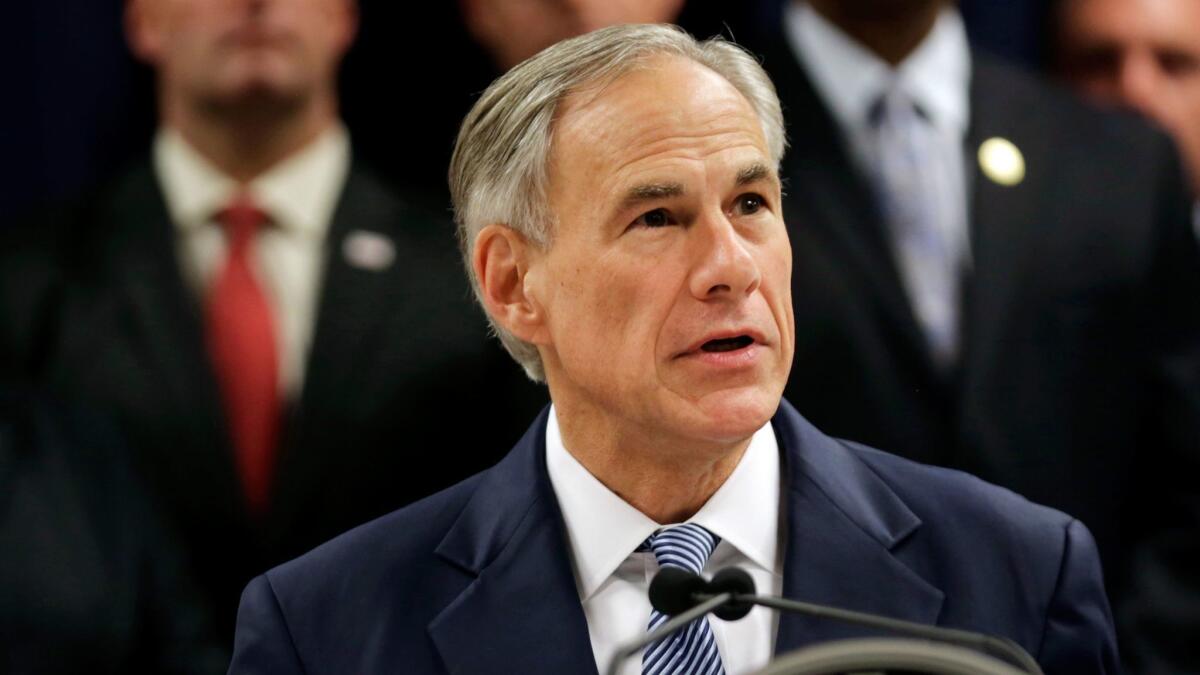Texas announces lawsuit against local officials considered hostile toward ‘sanctuary cities’ ban

The Texas attorney general announced Monday that the state had filed a lawsuit against local officials he said were hostile toward a ban on “sanctuary cities” that threatens to punish sheriffs and police chiefs who refuse to cooperate with federal immigration agents.
Atty. Gen. Ken Paxton said the state’s new law, signed a day earlier by Gov. Greg Abbott, was vital to securing the state’s borders.
“Unfortunately, some municipalities and law enforcement agencies are unwilling to cooperate with the federal government and claim that [the law] is unconstitutional,” Paxton said in a statement.
The state’s complaint is a preemptive move against immigrant advocacy groups that have promised to challenge the law, formerly Senate Bill 4, which becomes effective Sept. 1. The law allows police to ask about immigration status during routine stops and threatens authorities with fines and jail time if they do not comply with federal requests.
Opponents have argued that the law is potentially unconstitutional and could lead to officers engaging in racial profiling.
Among the defendants named in the lawsuit is Sheriff Sally Hernandez of Travis County, which includes the state capital, Austin, who said this year she would not voluntarily comply with federal requests to detain people solely on the basis of their immigration status.
Other defendants include Austin Mayor Steve Adler, the city’s interim city manager, all of Austin’s City Council members, and the Mexican American Legal Defense and Educational Fund, a civil rights organization.
“For five months, we’ve been on the sidelines while the legislature has treated Austin’s safety like a political football,” Adler said in a statement. “I’m glad the action is moving to court where it’s not about politics, it’s about the law. A judge will decide whether the United States of America or Texas determines federal immigration policy and whether local police and prosecutors have the discretion to keep their communities safe.”
Austin City Councilman Gregorio Casar, a Democrat who represents a heavily Latino district, said Republican leaders in Texas were trying to pressure elected officials into betraying their immigrant constituents, but that he and others were committed to fighting the “racist and unconstitutional” law.
Thomas A. Saenz, president and general counsel of the Mexican American Legal Defense and Educational Fund, said the lawsuit was frivolous and premature, demonstrating the state’s “apparent high anxiety” about its new law.
Hernandez’s office declined to comment on the lawsuit, instead reissuing a statement made when the bill passed the legislature last week.
“This is not in the best interest of public safety,” Hernandez said. “It ties the hands of our law enforcement agency and pushes victims of crime into the shadows. While I hate seeing a state law like this come to pass, I have always followed the law and that will not change.”
The state’s lawsuit asks the U.S. District Court for the Western District of Texas to rule that the new Texas law does not violate the 4th Amendment right to protection against unreasonable searches and seizures or the 14th Amendment right to equal protection and is not preempted by federal law.
“Governments throughout Texas have a clear duty to continue holding undocumented and suspected criminal aliens pursuant to [Immigration and Customs Enforcement] detainers,” Paxton, a Republican, said in a statement. “This is a public safety issue that requires swift resolution.”
Law enforcement officials across Texas were revising policies in preparation for the new law.
San Antonio Police Chief William McManus said Monday that his department would remove a policy that prohibits his nearly 2,400 officers from asking about a person’s immigration status. But he warned that the new law could endanger public safety by discouraging immigrants from reporting crimes and interacting with law enforcement officers.
“We don’t want people to fly under the radar,” McManus said at a news conference. “We want them to help us solve crimes.… I’m afraid that people will shy away from the police altogether. People are not afraid to interact with us. My fear is that they will be, going forward.”
The Republican governor on Sunday hailed the nation’s most sweeping law to target sanctuary cities for immigrants as “doing away with those that seek to promote lawlessness in Texas.”
“Texas strongly supports the legal immigration that has been part of our state from the very beginning,” said Abbott, who signed the law on Facebook Live on Sunday evening. “But legal immigration is different from harboring people who have committed dangerous crimes.”
Sheriffs and police chiefs in major jurisdictions across Texas have spoken out against the measure, testifying to legislators that it is likely to damage police relations with the community and potentially lead to racial profiling and lawsuits.
The Mexican government also decried what it called the negative effects of the law.
The Mexican Foreign Ministry said in a statement Monday that the state’s new legislation further criminalizes immigration, “foments acts of racial discrimination” and “contains various elements that could be harmful for the rights of Mexican [citizens] and people of Mexican ancestry” who live in Texas.
The new law will let local law enforcement officials inquire about the immigration status of anyone they detain — even those stopped for minor traffic violations. The law also calls for local officials to comply with federal immigration requests to detain those who are suspected of being in the country illegally.
Police chiefs and county sheriffs who refuse to cooperate with federal requests, which are not mandatory under federal law, could face up to a year in jail. Cities, counties and campus police departments could also face stiff fines, from $1,000 to $25,500 a day.
Opponents of the law say it is stricter than Arizona’s contested 2010 law, SB 1070, that required police officers to demand the papers of people suspected of being in the country illegally. That law was eventually amended.
“It’s a very sad day for Texas,” said Elissa Steglich, a law professor with the University of Texas Immigration Clinic in Austin. “Texas has long valued the extraordinary contribution of immigrants and this sends a chilling message to the community.”
Abbott signed the bill into law amid a heated national discussion on sanctuary cities, jurisdictions that opt not to hold immigrants arrested for local crimes past their release date simply because federal immigration authorities want them detained for potential deportation.
President Trump threatened in an executive order to strip federal funds from cities that do not cooperate with federal immigration agents. That part of the order is in legal limbo after a federal judge in California temporarily blocked it last month, arguing that placing new conditions on federal funds is potentially unconstitutional.
Jarvie is a special correspondent. Times staff writer Patrick J. McDonnell in Mexico City contributed to this report.
ALSO
Trump pledges to help his voters. In the meantime, he doesn’t mind punishing the opposition
U.S. judge blocks Trump order threatening funds for ‘sanctuary’ cities
UPDATES:
7:00 p.m.: This article was updated with information about a lawsuit filed by the Texas attorney general.
2:45 p.m.: This article was updated with additional reaction and background.
12:25 p.m.: This article was updated with reaction to the governor signing into law a bill against sanctuary cities.
This article was originally published at 7:25 a.m.
More to Read
Sign up for Essential California
The most important California stories and recommendations in your inbox every morning.
You may occasionally receive promotional content from the Los Angeles Times.










